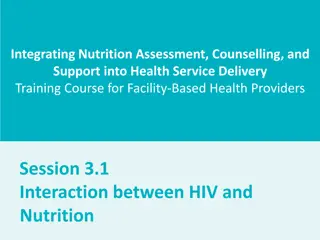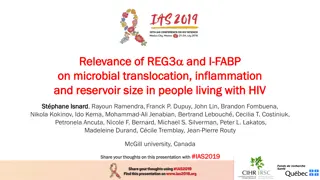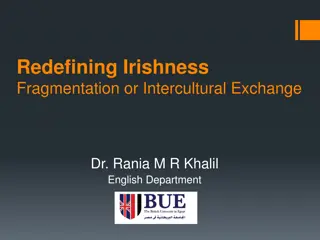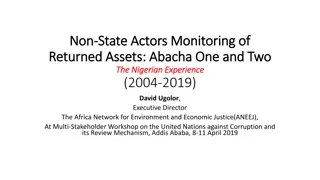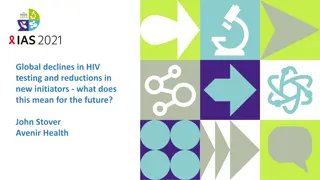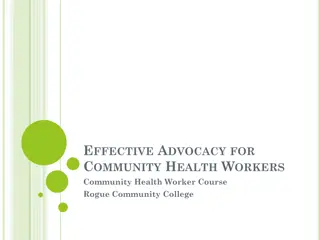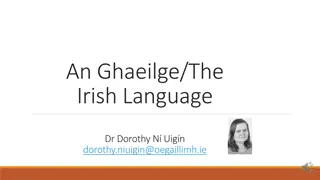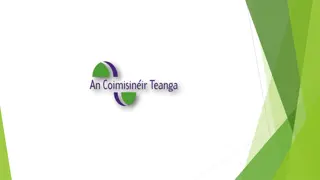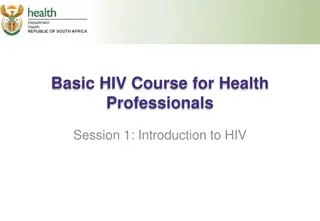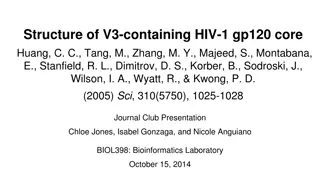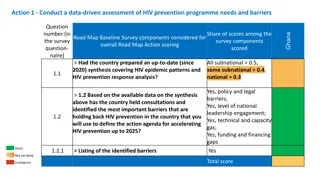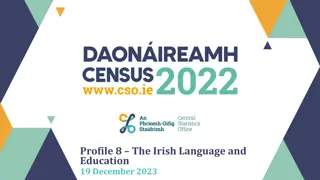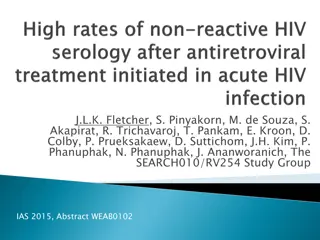Influence of Irish Civil Society in HIV Advocacy and Policy
Discover the impactful work of HIV Ireland in community support, prevention, education, training, policy, and research. Explore how Irish civil society plays a significant role in advocating for human rights-based approaches in HIV policies, despite facing challenges like poor national mechanisms and lack of transparency. Learn how partnerships and advocacy efforts aim to address these issues and place human rights at the forefront of their advocacy work within Ireland.
Download Presentation

Please find below an Image/Link to download the presentation.
The content on the website is provided AS IS for your information and personal use only. It may not be sold, licensed, or shared on other websites without obtaining consent from the author. Download presentation by click this link. If you encounter any issues during the download, it is possible that the publisher has removed the file from their server.
E N D
Presentation Transcript
Work of HIV Ireland Community Support Prevention, Education & Training Policy & Research Campaigning & Advocacy
Key Areas of Presentation Influence & Role of Irish Civil Society Civil Society, Advocacy & HIV Policy Human Rights Based Approach to Our Work Role of AAE in Supporting Advocacy at National Level
Influence and Role of Irish Civil Society
Long Tradition of Civil Society Activism in Ireland Originally church and religious based stepping in where state failed or refused to do so. Remain influential and powerful Many small, medium and large civil society groups and networks in Ireland Political and societal emphasis can often be on protecting the national interest which leaves those on the margins increasingly vulnerable Increasing tradition of input into human rights activism and structures e.g. Universal Periodic Review process; Shadow Reports (e.g. page 10 has point re: HIV included here after lobbying by HIV Ireland, ACET, Rialto CDT and UISCE http://www.rightsnow.ie/assets/12/CA112F0B- 5003-4355-994FBDD31DBB567F_document/DOC_1.pdf); Know Your Rights Campaign
Challenges Exist 1. Poor national mechanisms to question Government on implementing human rights obligations 2. Lack of transparency on decision making and budget allocations political decisions v evidence based decisions 3. Lack of detailed information on HIV in Ireland limits ability to inform policy 4. Recession and austerity has impacted negatively on the most vulnerable within Irish society, those least able to advocate on their own behalf
Meeting these challenges At all times it is crucial that PLWHIV are centrally and equally involved Positive Now and the All Ireland Network of People Living with HIV good Irish example (www.positivenow.ie). Place human rights at the centre of our work - this will give us integrity, strength and validity to advocate, and be heard. Civil society needs to work in partnership to an agreed vision and action plan. Win over Hearts and Minds; Use the Law
The Irish Constitution Statement of how the State should treat its citizens core values, laws and structures. It outlines certain basic rights: * Right to a fair trial (Article 38.1) * Equality before the law (Article 40.1) * Right to life (Article 40.3) * Right to liberty (Article 40.4) * Right to freedom of expression, assembly and association (Article 40.6.1) * Protection of the family (Article 41) In practice the courts have interpreted the constitution as also including other human rights bodily integrity, freedom from torture, inhuman or degrading treatment or punishment, right to work and earn a livelihood, right to privacy We need to use the law in our advocacy work in Ireland PILA/MLRC/IHREC (2014 Act in relation to Public Sector Duty)/Office of the Ombudsman/ examples Liberty, ACLU, ICCL carrot and stick approach.
Civil Society, Advocacy & HIV Policy
Be a Trustworthy & Credible Voice Civil society legitimacy arises from our experience of working alongside people living with HIV The voices of PLWHIV are crucial, and must be central to decision making High quality HIV related research will lead to evidenced based advocacy Clarity of messaging what are we saying and why? Are we united in what we are saying? If not, how do we privately & publicly manage differences of opinion? Work alongside state agencies and Governments in order for them to understand and appreciate the importance of civil society advocacy. We can speak out when they cannot. They can open doors that we cannot Immerse our work within Human Rights
A Human Rights Based Approach To Our Work
A human rights based approach begins with the conviction that all people are entitled to the protection and promotion of their human rights Human rights legislative framework Equality, non-discrimination & attention to vulnerable groups Empowerment Participation Accountability & Transparency
Conventions, Charters and Declarations EU Charter of Fundamental Rights Universal Declaration of Human Rights International Convention on Economic, Social & Cultural Rights European Social Charter International Convention on Civil & Political Rights UN Special Sessions and Political Declarations on HIV/AIDS European Convention on Human Rights
European Convention on Human Rights http://www.assembly.coe.int/nw/xml/News/News-View- EN.asp?newsid=5968&lang=2&cat=5 Impact of the ECHR on Member States Art 3 Right to freedom from inhuman or degrading treatment or punishment Art 5 Right to have lawfulness of detention speedily examined by a court Art 8 Right to respect for private life Art 10 Right to freedom of expression Art 11 Right to freedom of assembly Art 12 Right to marriage Art 13 Right to an effective remedy Art 14 Prohibition on discrimination
ECoHRs Country Based Decisions Georgia Art 3 improving healthcare in prisons, notably in terms of Hep C and TB prevention, diagnostics and treatment Germany Art 3 police must not threaten suspect with physical harm during interrogation Netherlands Art 5 judicial review of involuntary psychiatric detention Czech Republic Art 8 family must not be separated on grounds of material difficulties France Art 8 legal recognition of the new identity of post-operative transsexuals; Art 10 insulting the head of state is no longer a crime Greece Arts 8 & 14 legal recognition of same-sex couples Ireland Art 8 decriminalisation of homosexuality; children not to be placed for adoption without consulting biological father Moldova Art 11 no arbitrary ban on LGBT rights demonstration United Kingdom Arts 8,12 & 13 decriminalisation of homosexuality and protection of privacy for homosexuals serving in the military; protection of transsexuals from discrimination
Practical Tools in Implementing a HRBA It is crucial that we build networks and coalitions We must know who the decisions makers are We are seeking a rationale on how policy and decisions are arrived at within the context of a state bodies legal and human rights obligations protect, promote, fulfil Documenting what exactly the issue is, whether on a personal or more general level Be hard on the problem, soft on the people (may have its limits!) An initial 4-step process for Human Rights Advocacy i) Objective what do you hope to achieve? What is your best possible outcome and next best alternative? ii) Initial phone calls and emails to state bodies iii) More formal letters if required iv) Freedom of Information Request
The role of AIDS Action Europe in supporting advocacy at national level
Please Be Proactive!! AAE can proactively support civil society as follows: a) Capacity build PLWHIV and AAE members in the area of advocacy develop an advocacy toolkit based upon practical support and keep it concise b) Increase knowledge and training on human rights for AAE members how members can implement a human rights based approach within their work c) Conduct, support and promote quality HIV research that provides a solid evidence base to support lobbying and advocacy campaigns. Contextualise within a human rights framework d) Develop various communication mechanisms whereby AAE can ascertain what the key national issues for individual members are; common issues across many members; and how AAE can promote these issues on an EU policy level as this will filter down to national policy
Civil Society Advocacy To paraphrase Dr. Mary P. Murphy (NUIM) Do Not Be Silent Do Imagine Better Alternatives Do Build Progressive Alliances Lets Claim Our Space in Political Debate
Dankeschon! Thank You! Niall Mulligan Executive Director HIV Ireland, 70 Eccles Street, Dublin, DO7 A977 Tel: 01-8733799 Mob: 085 7457951 Fax: 01-8733174 e: niall.mulligan@hivireland.ie Website: www.hivireland.ie








